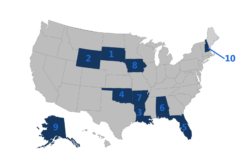When PCS orders move you to another state (or country), there’s a lot that needs to be done. On top of all the mental and emotional challenges of moving, there’s a painful amount of paperwork you’ll need to do too. One of the hardest things is knowing whom you need to inform about your military move and whether you need to change your state residency.
Do you need to register in a new state, especially if you’re going to live there for only a year?
As with many things in life, it depends.
Table of Contents
Military Home of Record
No. The service member does not need to change the home of record when they move.
The home of record is the state where they lived when they joined the military. It’s used to calculate state taxes withheld from the military paycheck. You don’t even need to update this if your family moves and you no longer have any contacts in that state.
However, at the end of military service, the military authorizes one final move of household goods to the state of record. So you may want to update it near the end of your military career once you decide where you want to live.
Post Office Address
Yes. You should give the post office a forwarding address when you move so you can continue to receive mail.
If you don’t have an address at your new duty station yet, you may use a parent or friend’s address. However, be prepared to follow up and change it once you get settled.
Driver’s License and Vehicle Registration
Maybe. You don’t necessarily need to get a license in your new state. In fact, mine is for a state I haven’t been in for six years.
You may not have to update your vehicle license plates, either. That depends on many factors, such as where the vehicle was purchased and whether that state requires inspections. (Each state has different requirements.)
The main problem is when a driver’s license nears expiration. Some states allow active duty military members to operate with an expired driver’s license when they’re stationed out of that state.
In addition, some states give military spouses and dependents an option to renew online or use power of attorney. However, others require you to appear in person to renew.
If you cannot renew in your former state, you’ll need to apply in your new state. Details for each state’s rules are available here.

Check your VA Home Loan eligibility and get personalized rates. Answer a few questions and we'll connect you with a trusted VA lender to answer any questions you have about the VA loan program.
Voter Registration
Sometimes. Most states link voter registration to a driver’s license, so you may be able to maintain your registration in your old state after you move.
To vote in an election when you aren’t physically able to go to the polls, you must use an absentee ballot. These are easy to acquire at the Vote.org website.
However, remember that you must request the ballot several weeks before an election. Some states count absentee ballot votes only if the election is a close call. If you prefer to vote in your current location, you must update your voter registration and your state driver’s license.
Taxes
It depends. For the service member, state taxes are taken out based on the home of record, which is usually the same as their state of legal residency, regardless of where they’re currently stationed.
However, these are two different terms and could be different states in some cases. Learn the difference here.
Military spouses can benefit from the Military Spouse Residency Relief Act, which in many cases, offers a choice to declare state taxes in the service member’s home of record or in the state where the spouse is currently working and has established residence.
This exception is only for income earned in the states, not for other jobs, income, or things like property tax. Research to learn if this applies to your situation and which state will give the best deal.
No matter your situation, it pays to keep your tax documents organized. When it’s time to move, this will be one less headache.
Credit Cards and Bills
Yes. You must contact each company that currently sends you mail and update your address.
Otherwise, you may miss billing statements or important notices. Typically, changing your address will not change your bills, unless it is for car insurance, which is calculated by zip code.
Professional Certifications
Yes. If you’re professionally certified as a teacher, nurse, health professional, lawyer, or any other job requiring a state certification, you’ll need to apply for re-certification in your new state.
Recent laws have attempted to ease the transition when military spouses move to a new state. However, the rules are not consistent between states, so you’ll need to research the rules for your state.
A spouse must still complete the re-certification application in the new state. Still, the laws allow for conditions such as a temporary license, an expedited license review, or reduced application fees. You can learn more about the military spouse license requirements here.




About the comments on this site:
These responses are not provided or commissioned by the bank advertiser. Responses have not been reviewed, approved or otherwise endorsed by the bank advertiser. It is not the bank advertiser’s responsibility to ensure all posts and/or questions are answered.